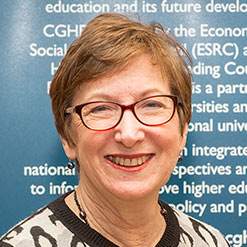Rankings and higher education: reframing relationships with and between states
- Ellen Hazelkorn, Dublin Institute of Technology
Overview
Chair: Professor Michael Shattock
The annual Burton R Clark lecture on higher education has been established by the UCL Institute of Education on the basis of a generous donation by Adele Clark, widow of the late Burton R (?Bob?) Clark (1921-2009).?
In the second Burton R Clark annual lecture on higher education, Professor Ellen Hazelkorn from Dublin Institute of Technology will discuss the growing significance of global university rankings in shaping higher education?s role and purpose.
Global university rankings are no longer simply about enhancing student choice but about geopolitical positioning for universities and nations. They are an inevitable manifestation of the internationalised higher education market and world economy.
Professor Hazelkorn will consider two key dimensions which have helped reframe the relationship between higher education and the state: 1) the accountability agenda, and 2) the geopolitical nature of higher education.
Measurements of university ?quality?, once led by universities themselves, are now driven and regulated by the state. What factors have caused this transformation? And what is the link between the popularity of rankings and the increasingly geopolitical responsibilities of universities?
Background
Higher education is a global enterprise. Its success (or failure) is integral to and a powerful indicator of the knowledge-producing and talent-attracting capacity of nations. But the landscape in which higher education operates today has become extremely complex; there are many more demands and many constituencies ? the latter often with conflicting opinions ? which have an impact on and a voice in shaping higher education?s role and purpose. Since the millennium, university rankings have become one of these influencing voices. Rankings are no longer simply about enhancing student choice, but increasingly about geopolitical positioning for universities and nations.
Global rankings are an inevitable manifestation of the internationalised higher education market and world economy. They are testament to the fact that ability vs. inability to compete at this level has itself become a powerful driver. Reactions to these geopolitical currents are giving way, in different forms, to populist and/or nativist responses across the UK, US and Europe. In turn, these developments have changed ? and are changing ? the ways in which universities interact with the civil societies in the cities, regions and nations of their founding, and vice versa.
Burton Clark?s The Higher Education System, Academic Organization in Cross-National Perspective (1983) provided an important entr?e into this complex world of higher education relationships. But that world has changed considerably since Clark?s book was published. If Clark was writing today, he would engage with these issues in ways that arguably weren?t necessary or relevant in 1983.
Discussion
Professor Hazelkorn?s talk is divided into four parts. Part one reflects on her own journey, from looking at rankings as a phenomenon influencing university decision-making to being an instrument reflecting and driving competition at university, national, and global levels, as well as being a lens into globalised higher education.
In the second part, Professor Hazelkorn will consider two key dimensions which have helped reframe the relationship between higher education and the state: 1) the accountability agenda, and 2) the increasingly geopolitical nature of higher education.
- In the first instance, quality has become a contested concept. Since the late twentieth century, massification and globalisation began to alter the relationship between higher education and the state. The internationalisation of higher education, the growth of a global professional labour market, the increasing presence of for-profit and transnational providers, and the link between higher education and economic recovery has transformed quality from being institutionally led to driven and regulated by the state. As a consequence, notions of quality are now a critical part of the architecture of international higher education.
- In the second instance, as nations increasingly compete based on their knowledge and innovation systems, higher education is at the centre of geopolitical relations. It has been transformed from a predominantly social institution with a local or sub-national remit to being the cornerstone of economic policy, with geopolitical responsibilities. Universities and nations are measured against each other, highlighting comparative and competitive global advantages and disparities in capacity and capability, and reflecting a world order in flux.
These developments coincide with and go some way to explain the rise of and fascination with global rankings.
In part three, Professor Hazelkorn will reflect on Clark?s triangle of coordination. She will briefly discuss what it tells us about higher education?s relationship with/to the state and other policy actors, and then ask to what extent developments over the past decades change his model.
Professor Hazelkorn will conclude with some thoughts about the implications of this model for higher education today ? especially in the context of recent political developments. We sit at a historic junction ? one in which higher education has the opportunity and responsibility to play a critical role in (re)building a shared sense of societal purpose and identity.
To be effective, higher education needs to move away from arguments of self-interest and victimhood. It needs to take a pro-active role ? to reshape relations with its publics and the state, and re-orient itself qua an anchor institution alongside its students, staff and graduates, and the wider community, and qua an intellectual force to bridge the gap between local, national and global.

